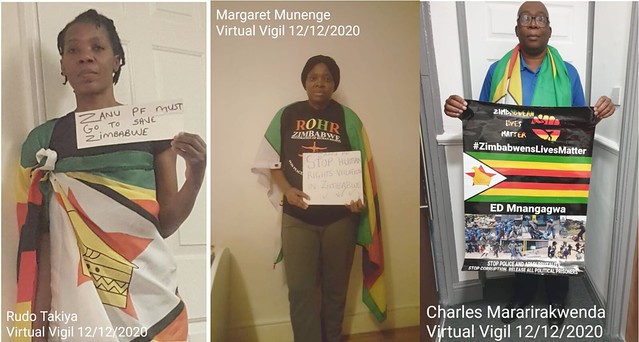
https://www.flickr.com/photos/zimbabwevigil/50711421807/sizes/m/
MDC MP Priscilla Misihairambwi-Mushonga unrolled a reed mat in front of the Finance Minister Ncube and then knelt down showering praise on him before handing him a wooden plate and two tshirts saying she was proud of him for providing sanitary ware for girls.
Some MPS questioned why she was allowed to perform this ritual, asking why women were expected to kneel before men (see: https://www.newzimbabwe.com/misihairabwi-mushonga-in-mthuli-ncube-parly-drama/).
As for South Africa’s Chief Justice Mogeong’s comments, there are real fears that they might promote doubts about the safety of the anti-covid vaccines. He was filmed at a hospital event leading a prayer against ‘any vaccine that is of the devil, meant to infuse 666 in the lives of people to corrupt their DNA’. (666 is a widely recognised symbol for the devil.) He later defended his remarks saying that, as a Christian, ‘prayer was his constitutional right’. (See: https://www.enca.com/news/chief-justice-mogoeng-prays-against-vaccines-devil.)
Civil and political rights have come under added threat in Southern Africa because of Covid 19, according to the Crisis in Zimbabwe Coalition, which says the political elite has been abusing lockdown regulations to tighten their grip on power. The coalition, which groups Zimbabwean civil society organisations, marked international human rights day on 10th December with the theme ‘recover better, stand up for human rights’.
It cites rape, torture, discrimination, corruption, inadequate provision of health services and food insecurity as among the rights’ violations. ‘Consequently, the democratic deficiency in most SADC countries has been worsened by the Covid 19 pandemic’, it said. (See: https://www.thezimbabwean.co/2020/12/crisis-coalition-statement-on-international-human-rights-day/.)
Other Points:
- Any pretence that the Zimbabwean Broadcasting Corporation is politically impartial as required by the constitution has been exposed by the election of its chief correspondent Reuben Barwe to a Zanu PF position in Makoni. MDC Alliance spokesman Fadzayi Mahere said it was an absolute joke that a ZBC reporter can hold a political party office and keep his job (see: https://zwnews.com/zbc-chief-correspondent-reuben-barwe-wins-zanu-pf-election/).
- The corruption scandal engulfing Harare City Council has deepened with the alleged involvement of the Local Government Minister July Moyo and the Harare Metropolitan Provincial Minister Oliver Chidawu. They are said to have tried to get charges dropped against the Council’s Human Capital Director Cainos Chingombe, who is facing corruption charges for allegedly transferring into his personal bank account US$130,000 meant for the provision of water, sanitation, education and recreational services (see: https://bulawayo24.com/index-id-news-sc-national-byo-196098.html).
- Zimbabwe’s foreign missions are struggling, according to the chair of the parliamentary portfolio committee on foreign affairs who said some of the country’s embassies abroad were dilapidated and members of staff were failing to pay school fees and medical bills and drove rundown cars (see: https://www.newsday.co.zw/2020/12/chaos-as-zim-abandons-embassies/).
- Because of the coronavirus we can no longer physically meet outside the Zimbabwe Embassy in London, so we have a virtual Vigil while the restrictions continue. We ask our activists to put on Vigil / ROHR / Zimbabwe regalia and take a photo of themselves holding an appropriate poster reflecting our protest against human rights abuses in Zimbabwe. The photos are uploaded on our Flickr site: https://www.flickr.com/photos/zimbabwevigil/albums/72157717280772467. Our virtual Vigil activists today were Rudo Takiya, Charles Mararirakwenda and Margaret Munenge who all kindly contributed to Vigil funds.
- For Vigil pictures check: http://www.flickr.com/photos/zimbabwevigil/. Please note: Vigil photos can only be downloaded from our Flickr website.
Notices:
- The Restoration of Human Rights in Zimbabwe (ROHR) is the Vigil’s partner organization based in Zimbabwe. ROHR grew out of the need for the Vigil to have an organization on the ground in Zimbabwe which reflected the Vigil’s mission statement in a practical way. ROHR in the UK actively fundraises through membership subscriptions, events, sales etc to support the activities of ROHR in Zimbabwe. Please note that the official website of ROHR Zimbabwe is http://www.rohrzimbabwe.org/. Any other website claiming to be the official website of ROHR in no way represents us.
- The Vigil’s book ‘Zimbabwe Emergency’ is based on our weekly diaries. It records how events in Zimbabwe have unfolded as seen by the diaspora in the UK. It chronicles the economic disintegration, violence, growing oppression and political manoeuvring – and the tragic human cost involved. It is available at the Vigil. All proceeds go to the Vigil and our sister organisation the Restoration of Human Rights in Zimbabwe’s work in Zimbabwe. The book is also available from Amazon.
- Facebook pages:
Vigil: https://www.facebook.com/zimbabwevigil
ROHR: https://www.facebook.com/Restoration-of-Human-Rights-ROHR-Zimbabwe-International-370825706588551/
ZAF: https://www.facebook.com/pages/Zimbabwe-Action-Forum-ZAF/490257051027515
Post published in: Featured



 Kenyan President Uhuru Kenyatta recently granted a group of Shona people who migrated from Zimbabwe to Kenya between 1930 and 1950 citizenship, Kenyans.co.zw reports
Kenyan President Uhuru Kenyatta recently granted a group of Shona people who migrated from Zimbabwe to Kenya between 1930 and 1950 citizenship, Kenyans.co.zw reports








 Kathryn Rubino is a Senior Editor at Above the Law, and host of
Kathryn Rubino is a Senior Editor at Above the Law, and host of 






 Jordan Rothman is a partner of
Jordan Rothman is a partner of